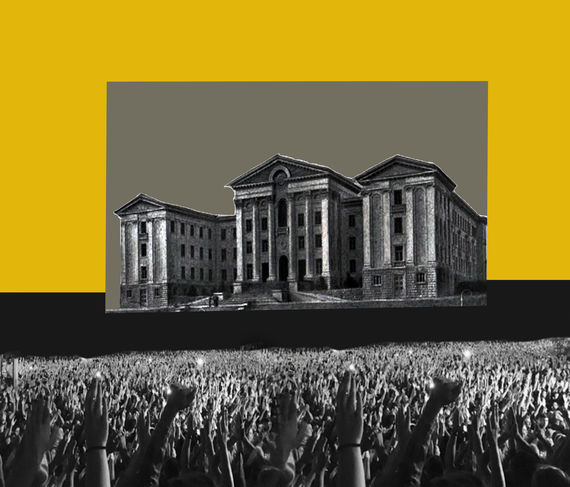Wed Oct 03 2018 · 5 min read
Backroom Machinations and the Shadow of a Mandate
Playing Chicken on Baghramyan Avenue

By Raffi Kassarjian

It’s being called Revolution 2.0. The dramatic events of October 2 culminated in the surreal sight of the country’s leader, accompanied by large crowds and the prime ministerial security detail, entering a blockaded parliament building to meet with the “opposition,” which in this case consists of three political parties and factions who together hold a 2/3 majority in the National Assembly. For those who have not followed the events of the past 24 hours, please see here,
Once again, society is divided into two camps: 1) the core supporters of the Velvet Revolution (Nikolards)[1], for whom Nikol Pashinyan’s struggle for justice and the revolution of love and solidarity continues, and 2) the “anti-Nikolards” whose main thesis is that the Constitution and public order must be protected at any cost, and who excuse the machinations by the majority parties as mere political maneuvering to improve their chances in the upcoming elections. In other words, populism and the will of the people vs. stability and maintenance of the previous order.
For the Nikolards, the thesis is simple: once again, the dark forces of the previous authoritarian regime (and their fair-weather friends in the Prosperous Armenia Party [PAP] and Armenian Revolutionary Federation [ARF]), are scheming to disenfranchise the people and return to the autocratic, semi-feudalistic order of things prior to the Velvet Revolution. They point to the 81 percent electoral victory of Pashinyan’s “My Step” coalition in the Yerevan municipal elections as proof that the “establishment” parties no longer have valid mandates.
The anti-Nikolards have a more complex and difficult position to defend. On the one hand, they claim that the current, legitimately elected parliament should function as per the Constitution, and has the right to pass laws according to the votes of the majority. On the other hand, while they also support the calling of early elections to get out of the deadlock of the current situation where the Prime Minister in a parliamentary republic does not enjoy a majority in the National Assembly, they realize that Pashinyan is well positioned to ride his popularity (and landslide victory in the Yerevan municipal elections) to win a clear mandate in early elections. Moreover, they claim, one cannot run a country by calling out street protests every time there is a constitutional or political hurdle. Finally, there is the unpleasant reality that they are in fact tacitly supporting the Republican Party of Armenia (RPA), with its storied past.
Populism – For or Against the People?
The sight of hundreds of thousands of people gathered adoringly in Republic Square, or tens of thousands responding within two hours of the Prime Minister’s Facebook call to join him in front of Parliament, are certainly impressive, and support the impression that Nikol Pashinyan is the people’s Prime Minister. The aerial images of tens of thousands lighting their smartphone flashlights in memory of Charles Aznavour are particularly heart-warming. However, what can we make of a situation where the Prime Minister is imploring the gathered crowd not to physically or verbally attack members of the National Assembly? How easily could a single spark turn such large gatherings violent or ungovernable? The term “counter-revolutionary,” so favored by Pashinyan and his team, is much more associated with 1790s France or 1920s-1980s Soviet Union – is that really the path we want to follow? One-party rule, no matter how “benevolent” the party seems or acts, is inherently prone to veering towards some form of autocracy. We must take care not to let mob rule overtake rule of law.
Backroom Machinations and the Shadow of a Mandate
On the other side, the traditionalists certainly do not exude confidence. If they are so sure of having a legitimate mandate by the people, why hold a snap vote on changes to parliamentary proceedings in the evening, without electronic voting or customary television coverage of the vote – what are they afraid of? Some anti-Nikolards maintain that this is a constitutionally legitimate way for the three parties (RPA, PAP, ARF) to protect their political interests, and that they are merely responding to Pashinyan’s strong-arm tactics to accelerate snap parliamentary elections to the end of this year. However, if collectively, they have gathered less than 7 percent of the vote in recent elections, and if the entire premise of the Velvet Revolution was a collective, national cry against the structure which supported this three-party political oligopoly, what is the basis of the mandate they purport to enjoy? By attempting to maneuver to improve their negotiating position vis-à-vis Pashinyan, they have reaffirmed the once-quiet electorate’s mistrust of them – it’s hard to see how they will claim legitimacy after this move.
All Roads Lead to Early Elections
Yesterday’s stand-off brings to light the fundamental political paradox existing since May 8 – a Prime Minister with no parliamentary majority governs the executive branch in a parliamentary republic – and we experienced both sides “flexing their muscles” to demonstrate their respective powers. The only truly democratic path forward is to move beyond this stalemate situation, via free and fair elections for a new National Assembly. In this matter, Prime Minister Pashinyan has the more democratically legitimate position, which is to hold these elections as quickly as possible. The anti-Nikolards’ protestations that holding the elections prior to the end of the year is unrealistic as all sides need more time to prepare properly, rings hollow. The three traditionalist parties are in fact the best-organized and most experienced political parties, with certainly a longer track-record and experience than either My Step, Luys, or the other “progressive” parties. Their underlying issue is different – they are not used to participating in truly competitive elections where they do not control administrative resources, and they’re trying to figure out how to adapt in time for these elections.
As a result, the two sides are engaged in a political game of chicken, because the constitutionally available mechanisms to trigger new elections hold risks for both sides (more so for Pashinyan). The traditionalists are playing for time to regroup and hope for events which will hamper or undermine Pashinyan’s popularity (a dangerous proposition given the extremely tense situation with Azerbaijan and Russia’s more adventurist foreign policy). The Prime Minister, on the other hand, continues to fuel populistic sentiment to keep the “street factor” alive as a political weapon, a strategy prone to fatigue via repetitive “tests” or the reverse – further radicalization. Therefore, the only plausible solution is to work together to hold elections as soon as possible. The alternative, chaos driven by uncertainty regarding who is in power or who can issue commands to the armed forces, is too dangerous to even consider.
------------------------------------------


